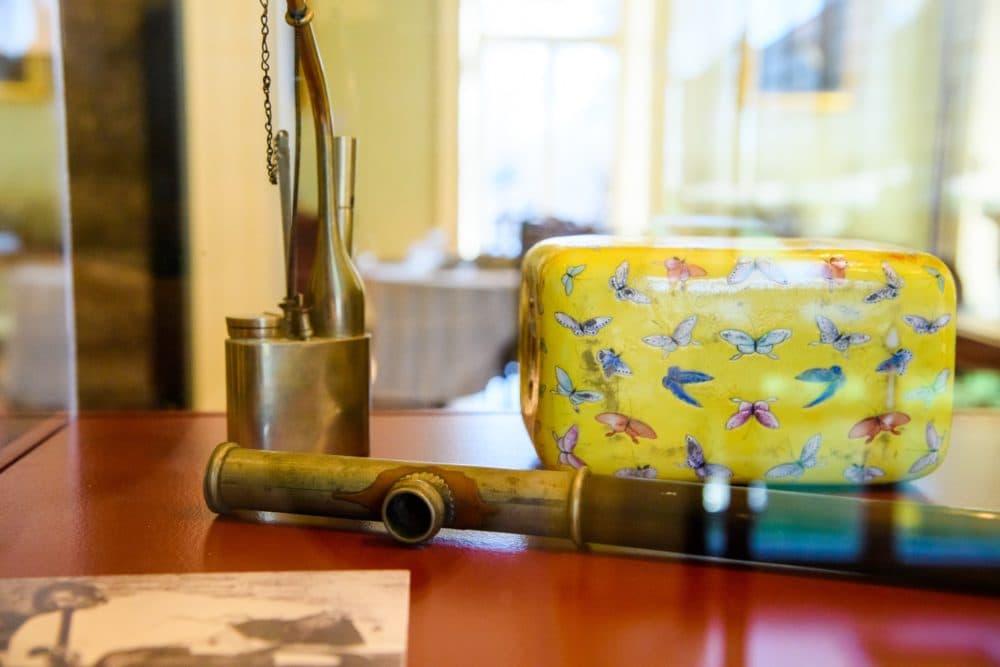Advertisement
Hidden History
How Boston profited from the opium trade in the 19th century
Resume
Some major Boston area institutions — the Boston Athenaeum, Mass General and McLean Hospital, Perkins School for the Blind among them — share a complicated history. They were all financed in part with money that local merchants made from trading opium with China in the 19th century.
At that time, American merchants imported heavily from China — tea and silk were the most sought-after items on their list. But the Chinese were less interested in Western goods. The only thing that sparked their interest was opium — a highly addictive substance that, at the time, was legal in the U.S. and illegal in China.
Prominent families, known as Boston Brahmins built their fortunes shipping — and in this case, on smuggling opium to China. The shipments caused clashes known as the Opium Wars and fueled addiction across China.
The Cabots, Cushings, Welds, Delanos (Franklin Delano Roosevelt's ancestors) and Forbes were among Boston families involved in the illegal trade.
WBUR's Radio Boston host Tiziana Dearing sat down with Heidi Vaughn, executive director of Forbes House Museum, and Peter Drummey, chief historian and Stephen T. Riley librarian at the Massachusetts Historical Society. Together, they unpacked the effects of the opium trade on Boston's past, present and future.
Highlights from this interview have been lightly edited for clarity.
Interview Highlights
On why the history of the role of the U.S. in the Opium Wars (which led to the Chinese Exclusion Act and anti-immigration sentiment in the U.S.):
Drummey: "A very powerful feeling in China that exists to this day [is] the unfairness of this foreign intervention in their country, both militarily in the Opium Wars, and in terms of this influx of the forbidden product that continues to this day.
"We think in the past few years about the return of sovereignty to China of Hong Kong, but we don't think of Hong Kong as essentially being this base right on the coast of China, which was taken as part of the treaty at the end of the First Opium War and essentially was this bastion of foreign policy and influence right within sight of the mainland of China."
On the history of Chinese immigration to the U.S.:
Drummey: "Chinese immigrants to America start early. There was a very early presence of a small number of people, but it's really the California Gold Rush that brings a very large number of immigrants from everywhere in the world, but a very large number of Chinese [people] who come to work in the gold fields. And then are essential in the building of the transcontinental railroad. [As well as the Granite Railway that ran in Massachusetts, from Quincy to Milton.]
"It's really striking, how, coming here, looking for opportunity and work — leaving a country [where] there were more things going on than the opium crisis ... China was riven by rebellions and essentially civil war through the course of the 19th century. So, people were leaving for opportunity."
On the origins of the Chinese Exclusion Act:
Drummey: "Chinese contract workers [were brought] essentially everywhere where there was hard, difficult work to do. And American merchants were involved in that business as well. In America, the presence of Chinese workers in the American West — there was ferocious reaction against this. ... People were afraid that people who worked hard for low wages were going to undercut the role and prosperity of American workers — to have immigrants displacing American workers. And that's the impetus of what becomes an exclusion act in 1882. It's for 10 years, but got extended and then was made permanent and lasts until the Second World War.
"[The act meant that] it was impossible for a person of Chinese ancestry essentially to become a citizen or live in the United States over an extended period of time. It was, I believe, the first time in U.S. history, where there was a law specifically aimed at an ethnic group."
On the complicated roots of Boston's philanthropists:
Vaughan: "[At the Forbes House Museum,] one of the last stops on the tour was looking at philanthropy and asking everyone to step back and ask themselves, what do you support and why do you support that. Because you can look at the Forbes' and wonder why they came to aid the Irish at the height of the Great Famine, but never thought to come to the aid of the Chinese. ... It was a lot of thinking about where you see the effects of your philanthropy and how close you are to the subject.
"This is a subject that deserves continued exploration. It's a very complicated history and it's not one that's going away. I think the more we dive into it, the more we could help on many fronts, in terms of helping people understand better how to get along with people that are different from them, but also to understand people who suffer from substance use. And appreciating that history is important in understanding our lives today and in navigating a path forward."
On learning from the past:
Drummey: "History doesn't repeat itself, but you can see in the past where things were changed, perhaps in ways that you don't think about: One of the reasons for the great crisis in opium addiction in China in the 19th century was a new delivery system. People were smoking opium rather than eating it or drinking it in liquid form. And that had a much more powerful effect, just as artificial opioids have had a role in this latest opioid crisis."
This article was originally published on June 20, 2023.
This segment aired on June 20, 2023.

